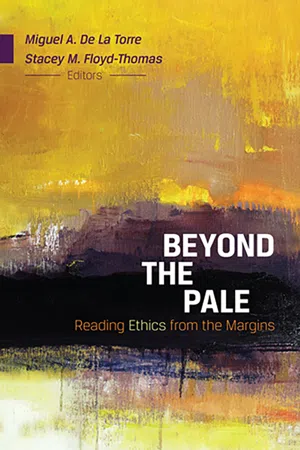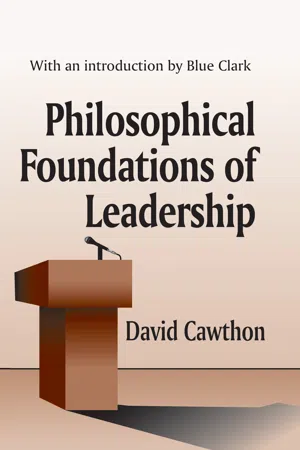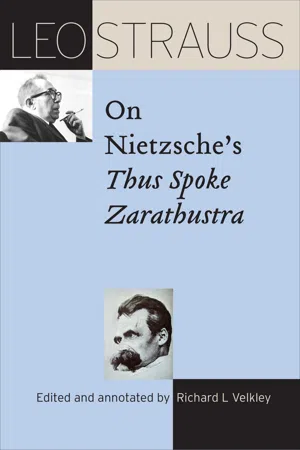Friedrich Nietzsche
Friedrich Nietzsche was a German philosopher known for his critiques of traditional morality, religion, and the concept of truth. He is often associated with the idea of the "will to power" and the concept of the Übermensch (Overman). Nietzsche's work has had a significant impact on political theory and has been influential in discussions about power, ethics, and the nature of human existence.
7 Key excerpts on "Friedrich Nietzsche"
- eBook - ePub
- Gregory Claeys(Author)
- 2013(Publication Date)
- CQ Press(Publisher)
...Jill E. Hargis Jill E. Hargis Nietzsche, Friedrich Nietzsche, Friedrich 593 596 Nietzsche, Friedrich It is hard to overstate the influence of Friedrich Nietzsche (1844–1900) on the political thought and politics of the twentieth century. In part because of Nietzsche’s sister’s manipulation of his writings after his death, his concepts of the will to power and the Ubermensch —literally “overman” but often translated as “superman”—were used in support of the ideology of National Socialism for the first half of the twentieth century. Efforts by American and Italian scholars in the 1950s and 1960s to translate and study complete collections of Nietzsche’s work introduced a more complex and richer Nietzsche whose work became important to a new generation of diverse theorists. Nietzsche’s political thought is important for having effected a break with many of the foundational ideas of modern thought and for thereby leading the way to contemporary or postmodern thought. His major writings include The Birth of Tragedy (1872), Human, All Too Human (1878–90), The Gay Science (1882), Thus Spoke Zarathustra (1883–85), Beyond Good and Evil (1886), and The Genealogy of Morals (1887). The posthumously published The Will to Power, a collection of Nietzsche’s unpublished manuscripts, remains controversial as to its representing or misrepresenting his beliefs. Biography Nietzsche was born on October 15, 1844, in the small town of Röcken in the Prussian province of Saxony. His parents were Karl Ludwig Nietzsche and Franziska Oehler; his father, a Lutheran minister, died when Nietzsche was five. In his youth, Nietzsche was greatly influenced by the Romantics, including Johann Goethe and Friedrich Hölderlin, as reflected in his earliest autobiographical writings, poems, and musical compositions...
- eBook - ePub
Beyond the Pale
Reading Ethics from the Margins
- Stacey M. Floyd-Thomas, Miguel A. De La Torre(Authors)
- 2011(Publication Date)
- Westminster John Knox Press(Publisher)
...10 Friedrich Nietzsche on Will to Power EDWARD P. ANTONIO From now on there will be more favorable preconditions for more comprehensive forms of dominion, whose like has never yet existed. And even this is not the most important thing; the possibility has been established for the production of international racial unions whose task will be to rear a master race, the future “masters of the earth”; a new, tremendous aristocracy, based on the severest self-legislation, in which the will of philosophical men of power and artist-tyrants will be made to endure for millennia—a higher kind of man who, thanks to their superiority in will, knowledge, riches, and influence, employ democratic Europe as their most pliant and supple instrument for getting hold of the destinies of the earth, so as to work as artists upon “man” himself. —Friedrich Nietzsche 1 Friedrich Wilhelm Nietzsche (1844–1900) was born in Röcken in Saxony. His father was a Lutheran pastor. Although he trained as a philologist and held no formal qualifications in philosophy, he is known as one of the most prolific philosophical thinkers of the nineteenth century. He became a professor of philology at the University of Basel at the age of twenty-four. His major works include Thus Spoke Zarathustra (1883–85), The Birth of Tragedy (1872), Beyond Good and Evil (1886), On the Genealogy of Morals (1887), The Antichrist (1888), Ecce Homo (1889), and The Will to Power (1901). He was not only an accomplished philologist but also a brilliant social critic. However, his brilliance was tarnished by his views on women and the way in which he applied his famous notion of “will to power” to marginalized communities...
- eBook - ePub
- David Cawthorn(Author)
- 2017(Publication Date)
- Routledge(Publisher)
...10 Nietzsche on Leadership: The Power of the Will “I do not wish to be mixed up and confused with these preachers of equality. Men are not equal. Nor shall they become equal!” —Friedrich Nietzsche In stark contrast to leadership theories based on democratic egalitarianism, undercurrents of nihilism were beginning to emerge in Germany as history evolved toward the millennium of the twentieth century. All previously accepted ideas were being challenged. Idealism. Realism. Rationalism. Romanticism. Nothing remained sacred. No previous attempt to understand the nature of the universe escaped attack by those philosophers who had rejected the validity of objective truth. Among the nihilists who would significantly alter our understanding of leadership in the twentieth century was Friedrich Nietzsche. Abandoning all philosophies that acknowledged the existence of transcendent principles as a means to explain man’s position in the universe, Nietzsche insisted that man was alone. There were no unifying principles. There was no metaphysics. And whereas Marx had removed the concept of the divine from the dialectic of history, Nietzsche eliminated God from the equation of existence. God is dead, he would proclaim, and upon that premise he would construct much of his philosophy. Without question, Nietzsche’s denial of universal principles has altered our understanding of the leadership dyad, for, if man stands alone, if there are no unifying principles, then our current understanding of rights, equality, justice, and liberty loses its meaning. Before considering the implications of Nietzsche’s thought, however, we must first examine the foundations from which his ideas regarding leadership emerged. We must review briefly his philosophy regarding the nature of man. Unlike those Western philosophers who perceived man as a part of a whole, whether that whole be defined as Form, the Ideal, the General Will, the Absolute, or the Species-Being, Nietzsche thought otherwise...
- eBook - ePub
- Ashley Woodward(Author)
- 2014(Publication Date)
- Routledge(Publisher)
...three Nietzscheanism and politics It is only beginning with me that the earth knows great politics. (EH “Destiny” 1) From the earliest receptions of Nietzsche in the late nineteenth and early twentieth centuries, he was embraced enthusiastically by representatives of both the extreme right and extreme left of the political spectrum, in the belief that his philosophy had significance for their own politics. Moreover, this interest in the purported political dimension of Nietzsche’s thought was signalled by Nietzsche’s first significant popularizer, Georg Brandes. During his lectures on Nietzsche in 1888, he focused on the political dimension of Nietzsche’s critique of culture, and ascribed to Nietzsche a political philosophy he described as “aristocratic radicalism” (a term Nietzsche himself approved) (Leiter 2010). Throughout the first part of the twentieth century, Nietzsche’s work was often embraced in relation to the politics of cultural renewal. This culminated with the darkest chapter in the history of Nietzscheanism, with which any consideration of Nietzscheanism and politics must come to terms: his appropriation by the Nazi Party, and the sullying of his name with the marks of nationalism and racism of the very worst extremes. After the end of the Second World War, Nietzsche interpreters typically sought to redeem him from the Nazi association by painting him as in reality an unpolitical thinker. However, matters have now changed. Interest in the political dimension of Nietzsche’s thought was substantially renewed by Tracy B. Strong’s Friedrich Nietzsche and the Politics of Transfiguration ([1975] 2000), and Nietzsche’s political thought has become one of the burgeoning areas of Nietzsche studies over the past twenty or so years. In this chapter we shall explore Nietzscheanism and politics through the following issues. First, we shall examine Nietzsche’s own political context in order to establish the nature and scope of his likely political interests...
- eBook - ePub
- Nigel Warburton(Author)
- 2014(Publication Date)
- Routledge(Publisher)
...In contrast with this he asserts that truth is necessarily truth from a perspective. In place of absolute good or evil, he reveals the dark psychological origins of everything those around him believe to have intrinsic value and worth. His method is a diagnosis of the ills of his society. His stance is for the most part that of an anthropologist examining the values of the culture in which he finds himself, but not a scientific anthropologist – more of a poet-prophet. The Title The title of the book describes Nietzsche’s intended position: whoever is interested in truth will stand beyond the simple black/white moral categories of good and evil, and will recognise morality for what it is. Morality is an expression of the fundamental life force he calls the Will to Power. The cherished values of his contemporaries, far from originating in compassion and universal love, have their deepest origins in cruelty and the desire to surpass others. The philosophers of the future will come to recognise this. As a result they will revalue all values. The will to Power The Will to Power is the basic life force that drives us all. Nietzsche believes that most people deny the truth about existence: for many that is the only way they can cope with living at all. They fail to recognise that exploitation and oppression can’t be eliminated since these are a fundamental part of nature. It is for Nietzsche an essential feature of life that the strong oppress the weak. This Will to Power is the source of everything that we are. All that is valued as good or benevolent has its beginnings in this life force. We hide from this difficult truth, but the free spirits of the future embrace it. On the Prejudices of Philosophers Nietzsche opens Beyond Good and Evil by turning his gaze on philosophers themselves, attacking their misplaced confidence in the power of reason which they allege leads them to the conclusions they hold...
- eBook - ePub
- Roy Jackson(Author)
- 2010(Publication Date)
- Teach Yourself(Publisher)
...In many respects the new philosopher will be like Zarathustra, compelled to go down and encourage people to act. He will be the bad conscience of his age – disagreeing with the majority opinions – and will be derided as such. These new philosophers will also be experimenters, not dogmatic in their views. As such, in a Darwinian sense, many will not succeed in their attempts, but it is hoped that years, if not generations, of experimentation will lead to a new age of stability, rather like the Laws of Manu (see below) which Nietzsche also saw as the stable product of many years of empirical experimentation. Does Nietzsche have any political views? Insight Ultimately, Nietzsche’s primary concern was with culture, and whatever heightened this was quite acceptable so far as he was concerned. Looking at democracy as it existed in Nietzsche’s time, this seemed to achieve the opposite, or so he believed. Some scholars have argued that Nietzsche, in fact, has no political ideals in his writings whatsoever and so to devote a whole chapter to Nietzsche’s political views could be misconstrued as way off the mark. However, many other scholars do argue for a political Nietzsche. As it is hoped has been made clear in this chapter, Nietzsche argued for a hierarchical society – certainly not democratic – in which at the top of the pyramid would be his philosophers of the future, his oligarchs of the spirit. This he discusses in Beyond Good and Evil, but another very interesting passage can be found in his later work The Antichrist in which he praises the Laws of Manu. These laws are Hindu in origin and date back some 2,000 years with codes concerning, amongst other things, the caste system. Consequently it is anathema to the modern liberal mind...
- Leo Strauss, Richard L. Velkley(Authors)
- 2021(Publication Date)
- University of Chicago Press(Publisher)
...Therefore I take this risk, but I urge you not to believe me and try to see with your own eyes: accept the statements which will stimulate your own thought but not the definite results of what I believe to be so. Even this must not be taken quite literally. Now after this warning, let me return to the subject I discussed at the first meeting. Let us look at Nietzsche in the light of earlier thought, and earlier political thought in particular. For this purpose, it is necessary to make a distinction between classical political philosophy and modern political philosophy. In modern philosophy, I shall distinguish what I called at that time and what I shall call now the three waves: the one beginning with Machiavelli, the second beginning with Rousseau, and the third beginning with Nietzsche. First, the classical principles, as far as they are indispensable for the understanding of our problem. Classical political philosophy is based on the view that man is a rational animal: man’s perfection is determined by his nature and rationality. Behind this is the view that every being has a specific activity, a specific work—in the Greek, ergon. This work may be done by the individual well or ill. To take a simple example, a horse cannot possibly fly, this cannot be the work of horse. But it can run, and it can do that well or badly. Similarly, there is a human activity which is not running, and which man exercises willy-nilly all the time but not always well, probably mostly badly. Man is by nature then ordered toward his perfection because his characteristic points to this perfection, just as the characteristic of the horse points toward the characteristic perfection of the horse. Man is by nature ordered toward his perfection, excellence, his virtue. Man has a natural inclination toward virtue...






